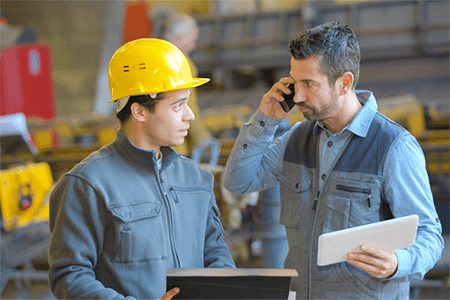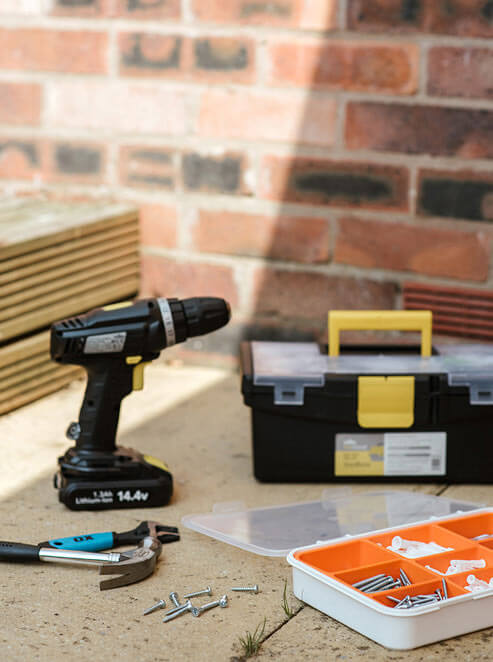Best CMMS for Manufacturing
Panther CMMS works incredibly well in a single building setting or a thousand building multi geo, regional & departmental environments
Education
-
Best CMMS for Higher Education
 Panther CMMS works amazing in single building school environment or a thousand building campus setting. When it comes to choosing a Computerized Maintenance Management System (CMMS) for higher education institutions, there are several options available, each with its own strengths and features. Here are five reasons given by our higher education customers to review when deciding whether to choose Panther CMMS.
Panther CMMS works amazing in single building school environment or a thousand building campus setting. When it comes to choosing a Computerized Maintenance Management System (CMMS) for higher education institutions, there are several options available, each with its own strengths and features. Here are five reasons given by our higher education customers to review when deciding whether to choose Panther CMMS.
Panther CMMS is a widely-used CMMS specifically designed for educational institutions. It offers features such as work order management, preventive maintenance scheduling, asset tracking, and reporting. It also integrates with other systems commonly used in educational settings. Panther CMMS is also a comprehensive facilities management solution that includes total CMMS functionality. It offers features such as asset management, work order management, space management, and capital planning. Panther CMMS is scalable and suitable for large higher education institutions with complex maintenance needs.
Panther CMMS is a CMMS solution that provides robust functionality for managing assets, work orders, and preventive maintenance. It offers mobile access, barcode scanning, and integrates with other systems. Panther CMMS is known for its ease of use and flexibility.
Panther CMMS is a web-based CMMS that offers a range of features including work order management, preventive maintenance, inventory management, and reporting. It is scalable and customizable to fit the needs of higher education institutions of various sizes.
Panther CMMS provides features such as work order management, asset management, preventive maintenance, and inventory management. It offers a user-friendly interface and can be accessed from any device with an internet connection.
When selecting a CMMS for higher education, it's important to consider your institution's specific requirements, such as the size of the campus, number of assets, maintenance workflows, and integration capabilities with existing systems. It's also beneficial to request demos and speak with references from similar educational institutions to evaluate which CMMS best aligns with your needs.
Scheduled preventative maintenance is beneficial for schools for several reasons:
- Cost Savings: Regular maintenance helps identify and address minor issues before they become major and expensive problems. Fixing a small problem during scheduled maintenance is often much more cost-effective than waiting until it escalates into a major repair or project.
- Extended Equipment Lifespan: Schools typically have a wide range of equipment and facilities, including HVAC systems, electrical systems, plumbing, and more. Regular maintenance can extend the lifespan of these assets, reducing the need for costly replacements.
- Safety: Schools have a responsibility to provide a safe environment for students, teachers, and staff. Preventative maintenance can help identify and address safety hazards such as faulty electrical wiring, slippery floors, or damaged playground equipment.
- Energy Efficiency: Well-maintained equipment and systems tend to operate more efficiently. This can lead to energy savings, which is not only environmentally responsible but also reduces operational costs for the school.
- Minimized Disruptions: Unscheduled breakdowns or equipment failures can disrupt classes and other school activities. Scheduled maintenance allows schools to plan for and minimize disruptions, ensuring that the learning environment remains as consistent as possible.
- Compliance: Schools are subject to various regulations and safety standards. Regular maintenance helps ensure that the school complies with these regulations, reducing the risk of legal and regulatory issues.
- Improved Indoor Air Quality: Regular maintenance of HVAC systems, including cleaning and filter replacement, can contribute to better indoor air quality, which is essential for the health and comfort of students and staff.
- Reputation and Enrollment: A well-maintained school with a safe and comfortable environment can enhance its reputation in the community. This, in turn, can attract more students and support enrollment numbers.
- Teacher and Staff Productivity: When teachers and staff don't have to deal with equipment breakdowns or uncomfortable working conditions, their productivity can improve, leading to a more effective educational environment.
- Long-Term Planning: Scheduled maintenance allows schools to plan and budget for repairs and replacements over the long term. This proactive approach helps avoid sudden financial crises and allows for better financial planning.
- In summary, scheduled preventative maintenance is essential for schools because it helps reduce costs, ensures safety and compliance, improves the learning environment, and contributes to the efficient operation of the institution. It is a proactive strategy that benefits both the school's budget and its overall effectiveness in serving students and the community.
Manufacturing
-
Best CMMS for Manufacturing Plants
 When it comes to choosing a Computerized Maintenance Management System (CMMS) for the manufacturing industry, several options are well-suited to address the specific needs of manufacturing facilities. Here are five reasons given by our manufacturing customers to review when deciding whether to choose Panther CMMS.
When it comes to choosing a Computerized Maintenance Management System (CMMS) for the manufacturing industry, several options are well-suited to address the specific needs of manufacturing facilities. Here are five reasons given by our manufacturing customers to review when deciding whether to choose Panther CMMS.
Panther CMMS is a robust CMMS solution that offers comprehensive asset management, work order management, preventive maintenance, inventory management, and analytics capabilities. It is highly scalable and provides features specifically designed for complex manufacturing environments.
Panther CMMS Plant Maintenance is a module within the system that focuses on managing maintenance activities in manufacturing plants. It integrates with other modules, allowing for seamless coordination between maintenance, production and supply chain functions. It offers extensive asset management and maintenance planning capabilities.
Panther CMMS is also a popular choice for manufacturing facilities. It provides features such as work order management, preventive maintenance, inventory management and reporting. It is highly customizable and offers flexibility to adapt to various manufacturing processes.
Panther CMMS is a comprehensive solution that offers features for asset management, work order management, preventive maintenance and supply chain integration. It provides industry-specific functionality for manufacturing, including equipment tracking, downtime analysis, and reliability-centered maintenance.
Panther CMMS is a user-friendly and cloud-based CMMS solution that caters to manufacturing and industrial environments. It offers features such as work order management, preventive maintenance, asset tracking and reporting. Fiix focuses on streamlining maintenance operations and increasing asset reliability.
When selecting a CMMS for manufacturing, it's essential to consider the unique requirements of your facility, such as the complexity of equipment and assets, integration capabilities with other systems (such as enterprise resource planning), scalability and the ability to handle preventive maintenance and predictive maintenance strategies. It's recommended to evaluate multiple options, request demos, and consult with industry peers to determine the best fit for your specific manufacturing needs.
Scheduled preventative maintenance is highly beneficial for manufacturing operations for several reasons:
Minimizes Unplanned Downtime: By proactively addressing equipment issues, scheduled maintenance helps prevent unexpected breakdowns and unplanned downtime. This means production schedules can be maintained, ensuring a steady output of goods.
Improved Equipment Reliability: Regular maintenance checks and servicing can identify and rectify potential problems before they lead to equipment failures. This enhances the reliability and longevity of machinery, reducing the need for costly repairs or replacements.
Enhanced Safety: Well-maintained equipment is safer to operate. Preventing equipment failures reduces the risk of accidents and injuries in the workplace, protecting both employees and the company from liabilities.
Optimized Performance: Regular maintenance keeps equipment running at its peak performance levels. This leads to increased production efficiency and higher product quality, as well as reduced energy consumption and waste.
Cost Savings: Although there is a cost associated with performing maintenance, it is often much less expensive than dealing with the aftermath of equipment failures. Repairs are typically more costly than routine maintenance, and the lost production during downtime can be even more expensive.
Compliance with Regulations: In many industries, there are strict regulations governing the maintenance and safety of equipment. Scheduled preventative maintenance helps ensure that your manufacturing operation remains in compliance with these regulations, avoiding potential fines or legal issues.
 Predictive Maintenance: Over time, scheduled maintenance can evolve into predictive maintenance. This involves using data and analytics to predict when equipment is likely to fail, allowing for even more precise and efficient maintenance scheduling.
Predictive Maintenance: Over time, scheduled maintenance can evolve into predictive maintenance. This involves using data and analytics to predict when equipment is likely to fail, allowing for even more precise and efficient maintenance scheduling.
Extended Asset Lifespan: Regular maintenance can significantly extend the lifespan of manufacturing equipment. This means that companies can get more value out of their initial investments in machinery.
Improved Planning: With scheduled maintenance, manufacturers can plan maintenance activities during periods of lower production demand, minimizing disruptions to the production process. This leads to better utilization of resources and reduced production losses.
Better Documentation and Accountability: Scheduled maintenance typically involves thorough documentation of all maintenance activities. This creates a record of the maintenance history of each piece of equipment, which can be valuable for tracking performance, making informed decisions about replacements or upgrades, and for demonstrating compliance in audits.
In summary, scheduled preventative maintenance is essential for manufacturing because it keeps production running smoothly, reduces costs, enhances safety, and extends the life of equipment. It's an investment in the long-term success and efficiency of a manufacturing operation.
Faclities Management
-
Best CMMS for Faclities Management
 Facilities management encompasses a wide range of activities, including maintenance, asset management, space management, work order management, and more. Here are five reasons given by our facilities management customers to review when deciding whether to choose Panther CMMS.
Facilities management encompasses a wide range of activities, including maintenance, asset management, space management, work order management, and more. Here are five reasons given by our facilities management customers to review when deciding whether to choose Panther CMMS.
Panther CMMS has extremely simple, fast and powerful facilities management capabilities. It provides features for work order management, asset tracking, preventive maintenance, space management, and service catalog. Panther CMMS is known for its scalability, simple pricing plans, 24/7 support and flexibility.
Panther CMMS is a widely-used integrated workplace management system (IWMS) that includes facilities management functionality. It offers features such as space management, maintenance management, asset tracking, real estate management, and sustainability tracking. ARCHIBUS is known for its robust capabilities and its ability to handle complex facility management requirements.
Panther CMMS is a solution that provides facilities management features for space management & maintenance management. It offers integration with other products and supports industry standards. Panther CMMS is suitable for small to large-scale facilities management operations.
Panther CMMS is a user-friendly and cloud-based CMMS solution that caters to facilities management needs. It provides features for work order management, preventive maintenance, asset management, and reporting. Panther CMMS is known for its ease of use and affordability.
Panther CMMS is a facilities management software that offers features for work order management, preventive maintenance, asset tracking, event scheduling, and reporting. It provides a user-friendly interface and supports collaboration across teams. Panther CMMS is suitable for small to large-sized facilities management operations.
When selecting a CMMS for facilities management, it's important to consider your specific requirements, such as the size and complexity of your facility, the number of assets to manage, integration capabilities with existing systems and the scalability of the solution. It's recommended to evaluate multiple options, request demos, and consider the feedback from other facilities management professionals to determine the best fit for your organization.
Scheduled preventative maintenance is crucial for facilities management for a variety of reasons:
Minimizes Disruptions: Regular maintenance helps identify and address potential issues before they become major problems. This reduces the chances of unexpected breakdowns and associated disruptions to facility operations. Facilities can continue to function smoothly, serving their intended purposes without interruptions.
Enhanced Equipment Reliability: Routine maintenance ensures that facility equipment and systems are kept in optimal working condition. This leads to increased reliability, reducing the likelihood of equipment failures and the need for costly emergency repairs.
Improved Safety: Well-maintained facilities are safer for occupants and visitors. Regular inspections and maintenance can identify and rectify safety hazards, reducing the risk of accidents and injuries.
Cost Savings: While scheduled maintenance incurs some upfront costs, it is typically much less expensive than addressing issues after they have caused major damage. Preventing breakdowns and addressing minor repairs early can significantly reduce repair and replacement expenses.
Energy Efficiency: Regular maintenance includes tasks like cleaning and calibrating equipment, which can improve energy efficiency. This translates to lower utility bills, reducing operating costs over the long term.
Compliance and Risk Management: Many facilities are subject to regulations and safety standards. Scheduled preventative maintenance ensures that facilities remain compliant with these regulations, reducing the risk of fines, penalties, or legal liabilities.
Extended Asset Lifespan: Proper maintenance extends the lifespan of facility assets, such as HVAC systems, elevators, and roofing. This means that facilities can maximize the return on their investments by delaying costly replacements.
Environmental Sustainability: Regular maintenance can include practices that reduce a facility's environmental footprint. For example, by ensuring that HVAC systems are running efficiently, facilities can reduce energy consumption and greenhouse gas emissions.
Planning and Budgeting: Scheduled maintenance allows for better planning and budgeting. Facility managers can anticipate maintenance costs and allocate resources accordingly, reducing financial surprises.
Tenant and Visitor Satisfaction: Well-maintained facilities create a positive impression on tenants, visitors, and occupants. This can lead to increased tenant retention, customer satisfaction, and a more favorable reputation.
Documentation and Accountability: Scheduled maintenance typically involves thorough documentation of all maintenance activities. This documentation can be invaluable for tracking the performance and history of facility assets, making informed decisions about repairs or replacements, and providing evidence of compliance in audits.
Resilience: Facilities that undergo preventative maintenance are often more resilient to unexpected events, such as extreme weather or other emergencies. This can be especially important for critical infrastructure facilities.
In summary, scheduled preventative maintenance is essential for facilities management because it helps ensure the smooth, safe, and cost-effective operation of facilities. It provides numerous benefits, including reduced disruptions, cost savings, improved safety, and environmental sustainability, making it a critical component of effective facilities management.
Healthcare
-
Best CMMS for Healthcare
 When it comes to choosing a Computerized Maintenance Management System (CMMS) for the healthcare industry, several options are well-suited to address the unique needs of healthcare facilities. Here are five reasons given by our healthcare maintenance management customers to review when deciding whether to choose Panther CMMS.
When it comes to choosing a Computerized Maintenance Management System (CMMS) for the healthcare industry, several options are well-suited to address the unique needs of healthcare facilities. Here are five reasons given by our healthcare maintenance management customers to review when deciding whether to choose Panther CMMS.
Panther CMMS is a widely-used CMMS specifically designed for healthcare organizations. It offers features such as work order management, preventive maintenance, asset tracking, and compliance tracking. Panther CMMS integrates with other healthcare systems, such as electronic health records and computerized provider order entry systems.
Panther CMMS offers a specialized CMMS tailored for healthcare facilities. It provides features for work order management, preventive maintenance, equipment tracking, and regulatory compliance. The solution is designed to meet the unique regulatory requirements and standards of the healthcare industry.
Panther CMMS is a flexible and customizable CMMS solution suitable for healthcare facilities. It offers features such as work order management, preventive maintenance, asset tracking, and reporting. Panther CMMS can help healthcare organizations streamline maintenance processes and ensure compliance with industry regulations.
Panther CMMS offers a healthcare-specific edition of its CMMS. It provides features such as work order management, preventive maintenance, inventory management, and regulatory compliance tracking. The solution is designed to meet the needs of healthcare facilities, including hospitals, clinics, and long-term care facilities.
Panther CMMS offers a specialized healthcare edition that addresses the maintenance and asset management needs of healthcare organizations. It includes features such as work order management, preventive maintenance, asset tracking, and regulatory compliance tracking.
When selecting a CMMS for healthcare, it's crucial to consider factors such as regulatory compliance, integration capabilities with other healthcare systems, scalability, and the ability to handle critical medical equipment maintenance. It's recommended to evaluate multiple options, request demos, and seek recommendations from other healthcare professionals to determine the best fit for your specific healthcare facility.
Scheduled preventative maintenance plays a crucial role in the healthcare industry for several reasons:
Patient Safety: The healthcare industry is focused on patient well-being and safety. Regular maintenance of medical equipment, such as imaging machines, surgical instruments, and patient monitoring systems, helps ensure that these devices function correctly and accurately. This, in turn, reduces the risk of medical errors and improves patient safety.
Compliance with Regulations: Healthcare facilities are subject to strict regulations and standards to ensure patient safety and quality of care. Scheduled preventative maintenance helps healthcare organizations remain compliant with these regulations, reducing the risk of fines and legal liabilities.
Reliable Diagnostic and Treatment Tools: Many healthcare procedures rely on highly specialized and sensitive equipment. Scheduled maintenance ensures that these devices are in optimal working condition, which is essential for accurate diagnostics and effective treatment.
Minimized Downtime: In a healthcare setting, downtime can be critical. Scheduled maintenance helps prevent unexpected breakdowns, reducing the chances of disruptions to patient care. Hospitals and clinics can maintain a high level of service availability.
Extended Equipment Lifespan: Healthcare equipment is often expensive. Proper maintenance can extend the lifespan of these assets, allowing healthcare organizations to get more value from their investments and reduce the need for costly replacements.
Cost Control: Preventing major equipment failures through regular maintenance can save healthcare organizations substantial repair and replacement costs. It also helps manage operational costs and allows for better budgeting and resource allocation.
Infection Control: In healthcare settings, cleanliness and infection control are paramount. Scheduled maintenance includes cleaning and sterilization processes that help prevent the spread of infections and diseases.
Efficient Workflows: Well-maintained equipment and facilities contribute to more efficient workflows. Healthcare providers can focus on patient care rather than dealing with equipment breakdowns or inefficiencies.
Diagnostic Data Integrity: Preventative maintenance ensures that diagnostic equipment, such as laboratory analyzers and medical imaging devices, produce accurate and reliable results. This is essential for making informed medical decisions.
Emergency Preparedness: In times of crisis or emergencies, healthcare facilities must be fully operational. Scheduled maintenance helps ensure that critical infrastructure, such as backup power systems and life support equipment, is ready to function when needed.
Accurate Record-Keeping: Healthcare facilities often require meticulous documentation for auditing, reporting, and compliance purposes. Scheduled maintenance generates records of equipment servicing, which can be crucial for regulatory compliance and quality assurance.
Patient Trust: Patients place a high level of trust in healthcare providers and facilities. Well-maintained equipment and a clean, safe environment contribute to a positive patient experience and can build trust in the healthcare organization.
In summary, scheduled preventative maintenance is essential in the healthcare industry to ensure patient safety, regulatory compliance, efficient operations, and cost-effective care delivery. It contributes to the overall quality of healthcare services and supports the industry's mission of providing the best possible care to patients.
Food & Beverage
-
Best CMMS for Food & Beverage
 When it comes to selecting a Computerized Maintenance Management System (CMMS) for the food and beverage industry, there are several options that cater specifically to the unique requirements of this sector. Here are five reasons given by our Food & Beverage maintenance management customers to review.
When it comes to selecting a Computerized Maintenance Management System (CMMS) for the food and beverage industry, there are several options that cater specifically to the unique requirements of this sector. Here are five reasons given by our Food & Beverage maintenance management customers to review.
Panther CMMS Food and Beverage CMMS: Panther CMMS offers a CMMS solution tailored for the food and beverage industry. It provides features such as work order management, preventive maintenance, asset tracking, and inventory management. The solution addresses the specific compliance needs, safety regulations and equipment maintenance requirements of the food and beverage sector.
Panther CMMS is a comprehensive software suite designed specifically for food manufacturing and processing facilities. It includes a CMMS module that offers features for work order management, preventive maintenance, sanitation tracking and equipment calibration. Panther CMMS focuses on ensuring food safety and regulatory compliance.
Panther CMMS is a CMMS solution that serves the food and beverage industry among other sectors. It offers features for work order management, preventive maintenance, asset tracking, and vendor management. Panther CMMS provides functionality to manage equipment maintenance, compliance, and documentation in food and beverage facilities.
Panther CMMS is a CMMS solution suitable for the food and beverage industry. It provides features for work order management, preventive maintenance, asset tracking, and inventory management. Panther CMMS offers specific functionality for managing critical assets, regulatory compliance, and documentation required in food processing facilities.
Panther CMMS offers an industry-specific edition for food and beverage companies. It includes features for work order management, preventive maintenance, asset tracking, and regulatory compliance tracking. Panther CMMS provides tools for managing food safety regulations, traceability, and quality control.
When selecting a CMMS for the food and beverage industry, it's important to consider factors such as compliance with food safety regulations, specific equipment maintenance requirements, inventory management for perishable items, and integration capabilities with other systems like enterprise resource planning (ERP) and production management systems. It's recommended to evaluate multiple options, request demos, and consult with industry peers to determine the best fit for your specific food and beverage facility.
Scheduled preventative maintenance is highly advantageous for the food and beverage industry due to its specific operational requirements and regulatory considerations. Here are several reasons why it is beneficial:
Food Safety and Quality Assurance: Ensuring food safety is paramount in the food and beverage industry. Scheduled maintenance helps prevent equipment malfunctions that could compromise food safety, such as contamination or spoilage. Maintained equipment also helps maintain product quality and consistency.
Regulatory Compliance: The food and beverage industry is subject to stringent regulations, including those set by organizations like the FDA and USDA. Regular maintenance helps companies meet compliance requirements, avoid fines, and uphold their reputation for safe and quality products.
Minimized Risk of Contamination: Scheduled maintenance includes cleaning and sanitation procedures that reduce the risk of cross-contamination or the growth of pathogens, which can cause foodborne illnesses.
Extended Equipment Lifespan: The food and beverage industry often relies on specialized and costly equipment. Preventative maintenance can extend the lifespan of this equipment, optimizing return on investment and reducing the need for frequent replacements.
Production Efficiency: Maintained equipment operates more efficiently and reliably, which leads to higher production rates and reduced downtime. This is especially critical in an industry with tight production schedules and high demand for products.
Cost Control: Regular maintenance can identify and address small issues before they escalate into costly breakdowns. It also helps manage operational costs and allows for better budgeting and resource allocation.
Energy Efficiency: Many food and beverage processes require significant energy inputs. Properly maintained equipment runs more efficiently, reducing energy consumption and associated costs.
Product Consistency: Consistency in food and beverage products is crucial for brand reputation and customer satisfaction. Maintained equipment helps ensure consistent product quality and taste.
Waste Reduction: Well-maintained equipment produces less waste, whether it's product waste due to production errors or energy waste due to inefficiencies. This can lead to cost savings and environmental benefits.
Traceability: In the event of a food safety issue or product recall, having records of scheduled maintenance and equipment performance can be invaluable for traceability and product accountability.
HACCP Compliance: Hazard Analysis and Critical Control Points (HACCP) plans are a fundamental aspect of food safety in the industry. Scheduled maintenance aligns with HACCP principles by preventing potential hazards and ensuring that critical control points are maintained.
Customer Trust: Consumers increasingly value food safety and quality. Regular maintenance contributes to a positive brand image and consumer trust, which can lead to higher sales and brand loyalty.
Environmental Responsibility: Maintaining equipment to operate efficiently reduces the environmental impact of food and beverage production. This aligns with growing consumer and regulatory expectations for sustainability.
In summary, scheduled preventative maintenance is essential in the food and beverage industry to ensure food safety, regulatory compliance, operational efficiency, cost control, and product quality. It not only safeguards public health but also supports the industry's goals of delivering safe, high-quality products to consumers while maintaining profitability and sustainability.
Hospitality
-
Best CMMS for Hospitality
 When it comes to choosing a Computerized Maintenance Management System (CMMS) for the hospitality industry, it's important to consider solutions that cater to the unique needs of hotels, resorts, and other hospitality establishments. Here are five reasons given by our Hospitality maintenance management customers to review.
When it comes to choosing a Computerized Maintenance Management System (CMMS) for the hospitality industry, it's important to consider solutions that cater to the unique needs of hotels, resorts, and other hospitality establishments. Here are five reasons given by our Hospitality maintenance management customers to review.
Panther CMMS offers a CMMS solution suitable for the hospitality sector. It provides features for work order management, preventive maintenance, asset tracking, and reporting. Maintenance Connection focuses on streamlining maintenance operations and improving guest satisfaction. Panther CMMS allows you to setup multiple guest forms allowing any guest to request work or repairs without a login.
Panther CMMS is a CMMS designed specifically for the hospitality industry. It offers features for work order management, preventive maintenance, asset tracking, and guest incident tracking. Panther CMMS integrates with other hotel systems, such as property management systems (PMS), to ensure seamless communication and efficient operations.
Panther CMMS is a cloud-based maintenance management solution built for the hospitality sector. It offers features for work order management, preventive maintenance, asset tracking, and task management. Panther CMMS focuses on improving operational efficiency and housekeeping coordination in hotels.
Panther CMMS is a CMMS solution designed for hotels and resorts. It provides features for work order management, preventive maintenance, asset tracking, and guest request tracking. Panther CMMS integrates with other hotel systems and offers mobile functionality for staff to handle maintenance tasks efficiently.
Panther CMMS is a CMMS solution that serves various industries, including hospitality. It offers features for work order management, preventive maintenance, asset tracking, and reporting. Panther CMMS provides flexibility and scalability to meet the maintenance needs of hotels and resorts.
When selecting a CMMS for the hospitality industry, consider factors such as the size and complexity of the property, integration capabilities with other hotel systems, mobile accessibility for staff, and the ability to track and manage guest requests efficiently. It's recommended to evaluate multiple options, request demos, and seek recommendations from other hospitality professionals to determine the best fit for your specific establishment.
Scheduled preventative maintenance is highly beneficial for the hospitality industry, which includes hotels, resorts, restaurants, and other accommodations and entertainment facilities. Here are several reasons why it is important in this sector:
Guest Satisfaction: Maintained facilities and equipment contribute to a positive guest experience. Well-functioning rooms, amenities, and public areas enhance guest comfort and satisfaction, leading to positive reviews, repeat business, and word-of-mouth referrals.
Operational Efficiency: Regular maintenance ensures that all equipment and systems, including HVAC, plumbing, and electrical, are working efficiently. This reduces the risk of unexpected breakdowns and service disruptions, allowing the hospitality business to operate smoothly.
Cost Control: Preventing equipment failures through scheduled maintenance helps control repair and replacement costs. It also allows for better budgeting by enabling the prediction of maintenance expenses.
Safety: In the hospitality industry, guest and staff safety is paramount. Regular inspections and maintenance help identify and rectify safety hazards, reducing the risk of accidents and injuries on the property.
Compliance with Regulations: Hotels and restaurants are subject to various regulations and safety standards. Scheduled maintenance helps ensure compliance, reducing the risk of fines and legal issues.
Energy Efficiency: Maintained HVAC, lighting, and other systems consume less energy, resulting in lower utility bills. Energy-efficient operations also contribute to sustainability goals and may appeal to environmentally conscious guests.
Extended Asset Lifespan: Hospitality businesses often invest heavily in furnishings and equipment. Preventative maintenance helps prolong the life of these assets, protecting the initial investment and reducing the need for replacements.
Reduced Downtime: Scheduled maintenance allows for planned downtime during low occupancy periods, minimizing disruptions to guests. This is especially important in hotels and resorts where continuous operation is expected.
Improved Aesthetics: Regular maintenance ensures that facilities and guest rooms remain in top condition. This contributes to the overall appearance and appeal of the property, enhancing its competitiveness.
Meeting Guest Expectations: Guests expect cleanliness, functionality, and high-quality service. Scheduled maintenance helps meet these expectations and aligns with the hospitality industry's focus on delivering exceptional experiences.
Food Safety: In the case of restaurants and food service establishments within the hospitality industry, scheduled maintenance is essential for food safety. Regular cleaning and inspection of kitchen equipment and refrigeration systems help prevent foodborne illnesses.
Guest Room Comfort: In hotels, comfortable guest rooms are crucial for attracting and retaining customers. Scheduled maintenance ensures that HVAC systems, plumbing, and other amenities in guest rooms are in excellent working order.
Event and Conference Facilities: Many hospitality establishments host events and conferences. Regular maintenance of audiovisual equipment, meeting spaces, and banquet facilities ensures the success of these functions.
Waste Reduction: Maintained equipment generates less waste due to production errors or energy inefficiencies, contributing to cost savings and environmental benefits.
In summary, scheduled preventative maintenance is essential in the hospitality industry to deliver exceptional guest experiences, control costs, ensure safety, and maintain the aesthetics and functionality of facilities. It is an investment in guest satisfaction, brand reputation, and the long-term success of hospitality businesses.
Non Profits
-
Best CMMS for Non Profits
 When it comes to choosing a Computerized Maintenance Management System (CMMS) for nonprofit organizations, it's important to consider solutions that offer the necessary functionality while also being budget-friendly. Here are five CMMS solutions that are well-suited for nonprofit organizations:
When it comes to choosing a Computerized Maintenance Management System (CMMS) for nonprofit organizations, it's important to consider solutions that offer the necessary functionality while also being budget-friendly. Here are five CMMS solutions that are well-suited for nonprofit organizations:
Panther CMMS is a user-friendly and cloud-based CMMS that offers a range of features, including work order management, preventive maintenance, asset management, and reporting. It offers affordable pricing plans and can be scaled to meet the needs of nonprofit organizations of different sizes.
Panther CMMS is a CMMS solution that provides features for work order management, preventive maintenance, asset tracking, and inventory management. It offers flexible pricing options, including discounted rates for nonprofit organizations. Panther CMMS is known for its ease of use and quick implementation.
Panther CMMS is a mobile-first CMMS solution that offers features such as work order management, preventive maintenance, asset tracking, and reporting. It provides an intuitive interface and affordable pricing plans suitable for nonprofit organizations.
Panther CMMS is a web-based CMMS that offers features for work order management, preventive maintenance, asset tracking, and reporting. It provides customizable solutions and pricing options that cater to nonprofit organizations' budget constraints.
Panther CMMS is a cloud-based maintenance management solution that offers features such as work order management, preventive maintenance, asset tracking, and reporting. It offers affordable pricing plans suitable for nonprofits and focuses on ease of use and simplicity.
When selecting a CMMS for a nonprofit organization, consider factors such as cost-effectiveness, ease of use, scalability, and the ability to handle basic maintenance and asset management requirements. It's recommended to evaluate multiple options, request demos, and consider the feedback from other nonprofit organizations to determine the best fit for your specific needs and budget. Additionally, some CMMS vendors may offer discounts or special pricing for nonprofit organizations, so it's worth inquiring about such options during the evaluation process.
Scheduled preventative maintenance is valuable for the nonprofit industry, just as it is for other sectors, though the specific benefits may differ. Here are several reasons why it is beneficial for nonprofit organizations:
Cost Savings: Nonprofits often operate on tight budgets with limited resources. Preventative maintenance helps control operational costs by reducing the need for expensive emergency repairs or replacements.
Resource Allocation: By planning and scheduling maintenance activities, nonprofits can allocate their limited resources more effectively, ensuring that critical assets remain in good working condition.
Program Continuity: Many nonprofit organizations provide essential services or programs to their communities. Preventative maintenance helps ensure the continuity of these services by minimizing disruptions caused by equipment breakdowns or facility issues.
Safety: Nonprofits may serve vulnerable populations or operate in challenging environments. Regular maintenance helps identify and address safety hazards, reducing the risk of accidents or harm to clients, staff, and volunteers.
Compliance: Some nonprofits are subject to regulations and safety standards, particularly those related to facilities or specific services. Scheduled maintenance helps nonprofits remain compliant with these requirements, avoiding potential legal issues.
Extended Asset Lifespan: Nonprofits often rely on donated or grant-funded equipment and facilities. Preventative maintenance can extend the lifespan of these assets, maximizing the value of donations and reducing the need for replacements.
Reputation and Donor Trust: A nonprofit's reputation is crucial for attracting donors and supporters. Well-maintained facilities and equipment demonstrate good stewardship of resources, building trust with donors and volunteers.
Environmental Responsibility: Nonprofit organizations that operate sustainably and efficiently may be eligible for grants or donations from environmentally conscious donors. Preventative maintenance contributes to sustainability by reducing waste and energy consumption.
Community Impact: Nonprofits play a vital role in their communities. Ensuring that facilities and equipment are in good working order allows nonprofits to have a positive and lasting impact on the communities they serve.
Volunteer and Staff Productivity: Nonprofits often rely on volunteers and dedicated staff. Well-maintained facilities and equipment make their work environment more comfortable and efficient, improving overall productivity.
Resource Mobilization: Preventative maintenance can help nonprofits secure funding by demonstrating a commitment to responsible resource management. Grant-making organizations and donors often look favorably upon organizations that invest in long-term sustainability.
Emergency Preparedness: In times of crisis or natural disasters, nonprofits may be called upon to provide essential services. Maintained facilities and equipment are more likely to withstand such events, ensuring the nonprofit's ability to respond effectively.
Program Expansion: Nonprofits that maintain their infrastructure and assets are better positioned to expand their programs and services, thereby increasing their impact on the community.
In summary, scheduled preventative maintenance is advantageous for nonprofit organizations because it helps control costs, ensure program continuity, maintain safety, and build trust with donors and the community. It contributes to the nonprofit's ability to fulfill its mission and have a positive and lasting impact on society.
Never too late to switch to a better CMMS
Start from Scratch or Get Help
Request our technical team to transfer all your current data into Panther CMMS



